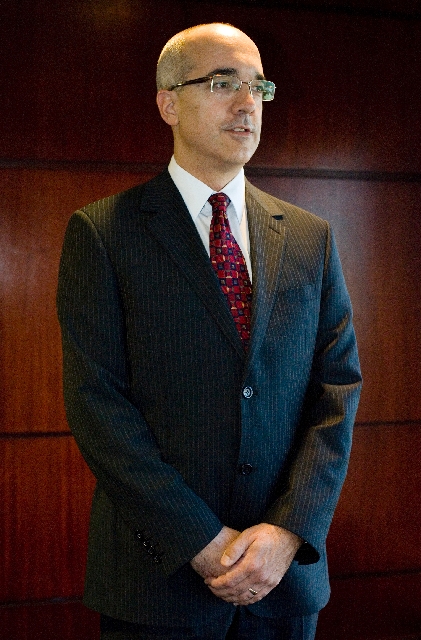Denis: Legislature needs to handle funding issues
CARSON CITY — Senate Majority Leader Mo Denis wants to pass bills next month to provide adequate funding for education and state government.
He’s not interested in supporting a Senate Republican plan for an alternative mining tax in lieu of a business tax that voters would consider in the 2014 election.
“We need to put something in place now as a Legislature,” the Las Vegas Democrat said. “It would be better than palming it off on voters.”
While there are differing legal opinions on whether the Legislature could put an alternative tax question before voters, Denis believes it makes more sense to pass bills before the Legislature adjourns in June that adequately fund government. He has stressed that students and parents cannot wait another two years before there is money available to pay for lower class sizes and full-day kindergarten.
But six Senate Republicans led by Minority Leader Michael Roberson, R-Las Vegas, still are talking about placing before voters next year a question that calls for much higher mining taxes beginning in 2015 and earmarking the money for public education. Voters then would decide between this tax increase and a 2 percent business margins tax sought by the Nevada State Education Association, which represents teachers.
This dispute might become the overriding issue in May when the Legislature must decide whether to increase taxes this year. By then, legislators will have approved most state agency budgets and Democrats will know much more about the amount of money they believe is needed.
Roberson, Republicans and Gov. Brian Sandoval oppose any new taxes this year and have the votes to block tax increases sought by Democrats.
Conversely, Democrats, Sandoval and many Republicans oppose the Senate Republican move to put a tax question on the ballot next year and wait until the 2015 session before spending more on public education.
Roberson figures the Democrats will come around to his thinking when they realize they cannot pass tax increases this session.
THE BIG IF: MINING TAX HIKE
If no mining tax question is placed before voters, then the only question voters will decide is whether to implement the teachers petition to impose a 2 percent business margins tax — a plan that a line of businesses damned during a hearing last month.
This petition could win voter approval, according to a Retail Association of Nevada poll. Its chances might improve without an alternative question calling for higher mining taxes in 2015.
But if the alternative question also is on the ballot, then voters would decide between mining and business taxes. The one that draws the most votes, as long as it was more than half, would become law.
Denis believes that if legislators adequately fund education this session, then voters would have no reason to approve the business margins tax question. Democrats have not yet announced what taxes they would increase if that becomes necessary in May when revenue estimates are finalized and budgets have been completed.
But the Senate Republicans’ chances grew even dimmer a few weeks ago when Sandoval received a secretary of state legal opinion that they cannot put an alternative tax measure before voters. Yet in a March 17 opinion, the legislative counsel — their legal adviser — ruled they can.
Before a court can decide which opinion is correct, the Senate Republicans must pass their alternative ballot question — a question that has not yet surfaced in the form of a bill.
Roberson said recently that he is “working on” getting support from other legislators for the alternative tax proposal. He complained about Review-Journal reports that they might try to raise as much as $600 million to $800 million a year through higher mining taxes.
Instead Roberson said they have not decided how much to tax.
STILL AWAITING ALTERNATIVE DETAILS
But Denis has not seen anything from Roberson. Neither has Senate Revenue Committee Chairman Ruben Kihuen, D-Las Vegas, Assembly Taxation Chairwoman Irene Bustamante Adams, D-Las Vegas, or Republican Assembly Minority Leader Pat Hickey, R-Reno. All would be key players in placing an alternative question before voters.
“We don’t even know what he is supposedly going to be coming up with,” Hickey said.
“It is my position and the majority of my caucus that we are not focused this session on a ballot question for 2014. I don’t like budgeting by ballot initiatives.”
Kihuen and Bustamante Adams both said they would like to see something in writing. But they also are committed to enhancing spending on education during the current session.
Democrats have outlined about $500 million in additional spending they believe state government needs, including $310 million in educational spending beyond what Sandoval included in his budget.
Their unexpected ally in opposition to budgeting by ballot question is Sandoval. He sought and released an opinion from the secretary of state’s office that the Legislature cannot put an alternative tax proposal before voters. Scott Gilles, the deputy secretary of state for elections, ruled legislators could not draw up a tax alternative because they did not “reject” the Nevada State Education Association’s business tax petition.
Because the Legislature took no action on that petition by a March 15 deadline, Gilles said the state constitution stipulates an alternative tax question cannot be placed before voters. Also through their inaction, the business tax plan automatically went on the November 2014 ballot.
LEGISLATIVE COUNSEL’S REASONING
But the Legislative Counsel Bureau issued an opinion March 17 sought by Roberson that said legislators did not have to vote to reject the tax plan before they could propose an alternative tax for voters.
Chief Litigation Counsel Kevin Powers found that the meaning of the word “reject” includes the refusal to “hear, accept, consider, acquiesce in or otherwise adopt the statutory initiative ...” By their inaction, therefore, they were rejecting the union’s tax plan, he concluded.
Before any decision is made on whether Senate Republicans can put forward a tax alternative, they first must pass their alternative tax proposal through the Legislature. Then the secretary of state, or another party with legal standing, could challenge the question in court, according to Rick Combs, director of the Legislative Counsel Bureau.
Ultimately the state Supreme Court could determine if the alternative question would remain on the ballot, he added.
To this point, the Legislature has been largely free of partisanship. That could end in May.
Contact Capital Bureau Chief Ed Vogel at evogel@reviewjournal.com or 775-687-3901.

















